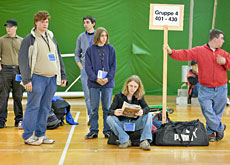Army criticised over fatal avalanche accident

The army has come in for criticism following the deaths of six young soldiers in an avalanche in the Swiss Alps – Switzerland's worst military accident for 15 years.
Questions have been raised about whether the risks were underestimated. The army says that the men, from the Mountain Specialists Division, were well trained and equipped.
The accident happened at 10am local time on Thursday morning as the troops were taking part in an exercise on the southwest flank of the Jungfrau peak in the Bernese Oberland region. Eight men were rescued unharmed.
Of the victims, who were from the French-speaking part of the country, five had almost finished recruits’ school and one was a sergeant. They were all part of Switzerland’s militia army and between the ages of 20 and 23 years old.
An investigation is underway to determine the cause of the accident. A result is not however expected until October.
But mountain experts have already raised doubts as to whether it had been wise to undertake the climb.
Hans Möhl, the head of the Rottal mountain hut, which is near the site of the accident, said he could not understand why the soldiers were on the Jungfrau, which is in the same range as the Eiger.
Conditions were difficult and there had already been several accidents at the same site, he added. Last year three alpinists died at the spot.
In Switzerland’s French-language media, the Geneva-based newspaper Le Temps questioned why the soldiers were allowed to go out in such bad conditions.
The Swiss Federal Institute for Snow and Avalanche Research in Davos confirmed that the risk of avalanches in the area was high.
Avalanche risk
The head of a local mountain guide centre told swissinfo it had snowed for the past few days and there was 40-60cm of new snow.
“[On Thursday] morning, I decided [together with my guests] not to go up the Jungfrau because of the snow conditions. Naturally, one has to take into account how experienced the climbers are,” said Johann Kaufmann, head of mountain sports in Grindelwald.
Urs Wellauer, deputy president of the Swiss Mountain Guide Association, has told the Berner Zeitung newspaper that it was rather late in the morning for the group to climb the mountain and that they should have been on their way down by 10am.
The investigating magistrate in charge of the case, Christoph Huber, told the Swiss news agency that it was now up to the military justice authorities to find out whether the avalanche danger had been properly considered.
The Bern cantonal police have already started questioning the mountain guides who were leading the party. The survivors are undergoing counselling, said officials.
Not risky
Army deputy commander Fred Heer has defended the decision to go into the mountains. He said it was not a “risky job” and that the soldiers had done “what thousands of others do in our mountains”.
“The people were excellently equipped for such a mountain tour and had been well trained over the last 17 weeks of their school,” Army spokeswoman Kirsten Hammerich told Swiss television.
She said that the mountain guides in charge of the expedition, on a routine training exercise, were very experienced.
Hammerich told swissinfo that the recruit school course would continue but over the weekend consideration would be given to whether to continue the programme.
The climbers were heading up the 4,158-metre mountain, roped together in two groups of three. They had reached a height of 3,800 metres when fresh snow dislodged, sending them plummeting into the valley below.
Defence Minister Samuel Schmid – on behalf of the Swiss government – expressed his condolences to the victims’ families and friends, adding that the men had died “serving their country”.
The flags are flying half-mast at the army’s headquarters in Bern.
swissinfo with agencies
Avalanche accidents such as the one on Thursday are rare in July, according to the Swiss Federal Institute for Snow and Avalanche Research in Davos.
The latest accident is the worst since February 1999 when 12 people were killed in a side valley of the Val D’Hérens in canton Valais.
Since the winter of 1997/1998 a total of 225 people have been killed in avalanches on Swiss mountains.
The victims were all part of the Mountain Specialists Division 1 in the Swiss militia army.
To be accepted into the recruit school in Andermatt, members have to fulfil two conditions: completion of a special group leadership course in one of the two fields: ski touring or mountaineering; and obtain marks good to very good in the sport exams that are part of the 3-day conscription to the army.
The unit is expected to be ready to be deployed and operational within 9 hours.

In compliance with the JTI standards
More: SWI swissinfo.ch certified by the Journalism Trust Initiative











You can find an overview of ongoing debates with our journalists here . Please join us!
If you want to start a conversation about a topic raised in this article or want to report factual errors, email us at english@swissinfo.ch.